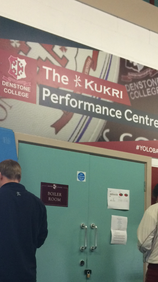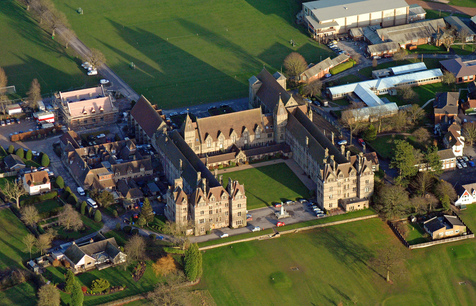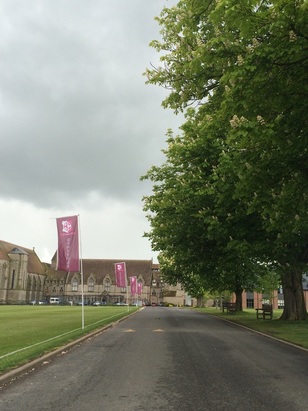A Day at Denstone College
What is the basis of the rugby program at Denstone?
For me, it is all about challenge and support. We want to put our rugby players out of their comfort zone in training, with their S&C, in matches etc. We present them with that challenge and support them as best we can to achieve it. If they are unable to meet the challenge as an individual or as a team then again, that is where the support comes in to help them build that resilience to go again.
And how does that feature into the overall objective for rugby?
The main objective is not to attain glory for the school. We play as tough a fixture list as we can to challenge the boys because our key aim is based around development and the educational benefits of rugby (such as teamwork, leadership, grit, respect). We want to provide the best school rugby experience possible so as to ensure that our boys continue to play and enjoy their rugby once they have left. The elite environment we seek to provide for our students has led to a number of students being involved with Academies such as Leicester, Worcester and Sale. Leavers gaining Academy contracts and playing to a very high level, as well as general participation at University and beyond, is an important driver and measure of success for us. We focus on competition, and all that brings, rather than just winning.
What have you put in place in order to foster than environment?
Across the board we apply elite principles to the school environment but the first key point for us is Character and Values. Within this we focus on Teamwork, Pride, Commitment and Enjoyment. The boys are aware of this but the challenge lies in ensuring that we all live those values rather than just be able to recite them. That's something that as a collective - staff and players, we strive to maintain. Second for us is Athletic Development. Our Strength and Conditioning (S&C) team do a fantastic job in co-ordination with us as rugby coaches to produce physically robust players who can cope with, and dominate, the demands of the game. We now have Movement Lit as a PE module in Years 7-9 and welcome all our students to the gym, and field-based athletic development sessions, so we can educate them in how to train in a safe manner. Third is Psychology, and finally Tactical and Skill Development. It's a whole-school initiative with an educational focus - encouraging our students to think about, and understand, the nature of their sport and training.
How does this approach manifest itself within the rugby environment for training and matches?
I have to say I'm a very competitive person, as are many of the boys. However there is a bigger picture. We focus on their development and rising to the challenge. Challenge Point Framework (Guadagnoli and Lee, 2004) talks about the optimum challenge for skill acquisition. We have established a continuum for the acquisition and retention of skill that we can apply depending on what stage of skill acquisition they are at - subsequently some sessions will have a theme of either Explore or Perform whereby the focus is either on learning, thinking and developing or performing and executing to a high level what has been covered in training.
Dan, can you explain the S&C provision at Denstone?
We have two full-time S&C coaches and we work both with the sports teams as well as with the students in general. Teams do have specific slots at times, and the older athletes are on more specific conditioning programmes which they complete during the course of the week. But we see it as a whole-school thing - Movement Literacy is a module in PE for our Year 7-9 students and lunch-time sees the Performance Centre open to any and all students of all ages. We apply high performance principles in a school environment with movement, education and enjoyment at the heart of our practise.
How do you ensure students are doing the right things and in a safe way - sometimes you must have to hold them back from getting on the bench press ASAP for example?
Sometimes, certainly initially we occasionally had to hold them back. But it is all about education. At Denstone now they are educated about how to treat their body around their training or in a nutritional sense. By no stretch to the younger pupils just come in and do what they want throwing the weight around - the educational side is informed in many ways by the Athletic Motor Skill Competencies (Rhodri Lloyd, 2013). So we have a programme in place called 'Earn The Right To Progress'. With various movements and levels of achievement we can progress the pupils in a safe manner as and when they are individually ready.
How does this tie in with the rugby at Denstone College?
We both work closely with Jamie to monitor the development of our athletes. The Performance Centre is a great opportunity to build and re-inforce the culture that we have established as well as to build the psychological characteristics that we want Denstone pupils to possess - resilience, determination and a desire to improve. Here, through S&C, we can provide the challenge for them in a physical and mental sense as well as providing the support necessary. We can keep things competitive and fun so that their health and fitness doesn't have to be seen as a chore. Again, it all comes down to education and enjoyment.
As the boys get older they'll have school rugby, maybe club/Academy/County involvement and also the S&C sessions - how do you manage to ensure they don't burn out?
One of the important values for having us here is that health & safety aspect to make sure the boys are progressing safely with their gym work. Part of this, of course, is to monitor them to ensure they aren't doing too much. They are in the habit now of entering the gym and using the laptop to record their soreness, tiredness and energy levels for each session. This gives us really important data that we can monitor so that, when required, we adjust their programme or tell them to rest. Likewise I may have to speak to Jamie to alert him to certain players' fatigue levels so that it can be accounted for in pitch sessions too.
It's incredibly impressive, and very clear that the students are buying-in to it all. It is also, from what I have seen, pretty rare in a school environment - is it something that will stay rare in your opinion?
It is rare to an extent. There are other schools and colleges who are also doing great things with their students in this respect. However I think it is about to explode and become much more commonplace. Whilst it does provide a competitive advantage, it is most importantly about education and challenging the students to improve.



 RSS Feed
RSS Feed
